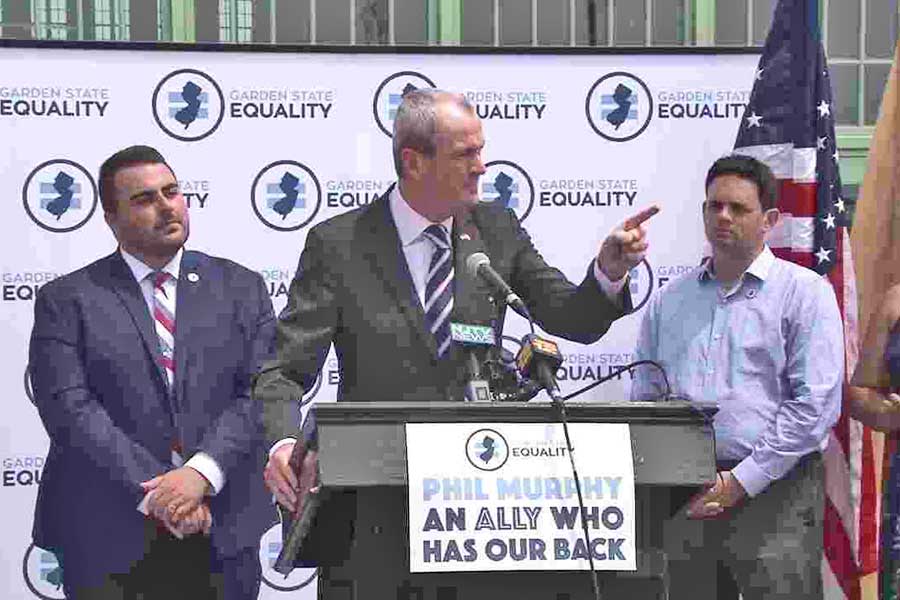Within the next five years, all public-school students in New Jersey will learn about the contributions of LGBTQ pioneers like Barbara Gittings and Harvey Milk as part of their regular social-studies curricula.
New Jersey Gov. Phil Murphy signed legislation that requires all public middle- and high-school teachers and boards of education to update curriculum to “accurately reflect the political, economic and social contributions” of gay, lesbian and transgender citizens.
In a statement to Philadelphia Gay News, the governor said he is “honored to sign the legislation” and “believes that ensuring students learn about diverse histories will help build more tolerant communities and strengthen educational outcomes.”
The law goes into effect during the 2020-21 school year, which gives advocacy and education groups time to develop appropriate resources for educators on how to weave LGBTQ-related stories into their lessons on U.S. history.
Garden State Equality worked with GLSEN to develop and promote the bill, and is now taking a lead in working with groups like Make it Better for Youth and the New Jersey Education Association to develop the appropriate instructional materials.
“We’re looking beyond textbooks — because most student learning doesn’t happen through textbooks anymore,” said GSE policy director Aaron Potenza, who pushed to get the bill scheduled and testified in front of the assembly and senate committees. “The goal is to develop resources on particular moments in LGBTQ history that not only highlight certain events, but also encourage broader thinking about how transformative those realities were to American history.”
For instance, a lesson about Stonewall would “create a vision of what is true to the reality of what actually happened on that night — that it was primarily transgender people and people of color who were instrumental in that fight,” he said.
Potenza added that students could also learn about court cases in the earliest days of the country that sought to condemn crossdressers, the McCarthy-era “Lavender Scare” that cost at least 1,000 LGBTQ government employees their jobs — and, in some cases, their lives — and the Hollywood code that restricted screenwriters from mentioning homosexuality in film.
Emphasis on LGBTQ history would not only educate students on how queer citizens have been part of the fabric of the country since the very beginning, but it also could have a positive impact on gay-related bullying in schools, said Potenza.
“GLSEN school climate surveys have found that students enrolled in schools that include LGBTQ-inclusive curriculum have vastly reduced events of bullying because of sexual orientation,” he said.
That added sense of security may also extend to educators.
Virginia DeWees, who identifies as nonbinary, recently moved to New Jersey from Baltimore to teach English to seventh- and eighth-grade students at Mastery Charter East Camden Middle School.
“Knowing that other teachers and not just ‘the gay teacher,’ as my students most likely see me, are teaching about LGBTQ issues will be really monumental in so many ways,” said DeWees. “It’ll make my day-to-day easier, being a queer teacher, and it’ll make my students’ lives easier. It’ll help reduce bullying and hopefully reduce mental-health issues that so many queer youth — and staff — experience.”
DeWees is optimistic that the effects of the bill will reverberate far beyond the Garden State.
“I also think that it’s going to have a national impact. With this policy, New Jersey students will become agents of change for ensuring that LGBTQIA+ members of society will be supported in all the institutions and communities in the country. They’ll set an example for the rest of this nation’s youth about what it means to be a socially engaged member of society.”
New Jersey is the second state in the nation to pass such a law, behind California, which enacted similar legislation in 2011. It’s also not the first time the neighboring state has forged ahead of Pennsylvania on issues of LGBTQ equality.
“There is nothing like [the LGBTQ curriculum bill] in the works right now for Pennsylvania. We don’t even have basic nondiscrimination protections in the statute,” said Jason Landau Goodman, executive director of Pennsylvania Youth Congress, which is pushing legislation that would ensure antidiscrimination protections for LGBTQ Pennsylvanians. “It is on our radar but … at this time, it would be up to local school districts to set LGBTQ inclusion in their curriculum.”
In a statement to PGN, J.J. Abbott, press secretary for Gov. Tom Wolf, said the governor “believes Pennsylvania students must have the ability to learn and thrive in school environments that address diversity, inclusiveness and equity, including the LGBTQ community.”
Abbott pointed to the Pennsylvania Department of Education’s Equity and Inclusion Toolkit, which contains LGBTQ and gender-identity-specific sections that enable teachers and administrators to access links to studies and resources on the importance of promoting inclusivity in the classroom and ways to incorporate queer-centric histories in their lesson plans.

